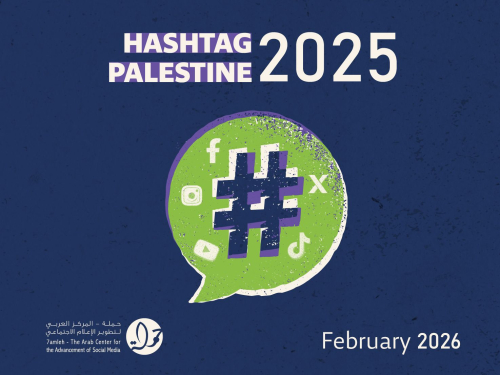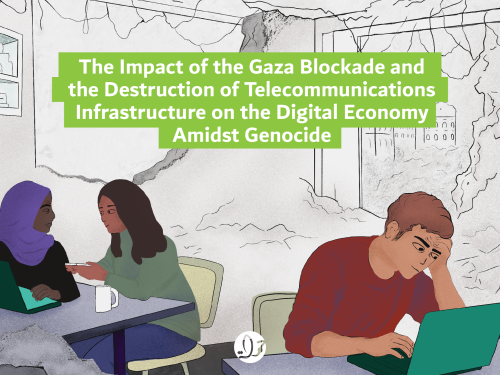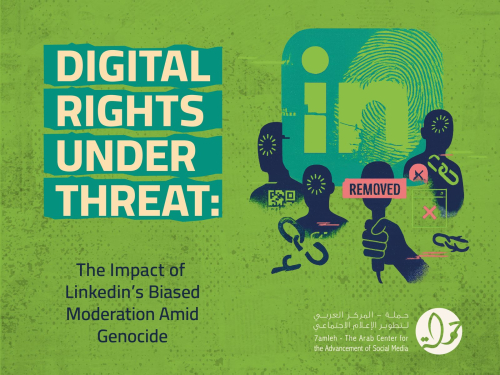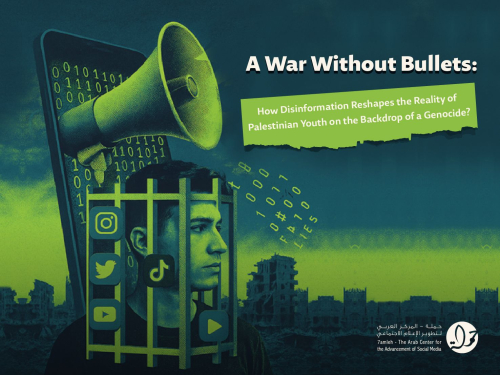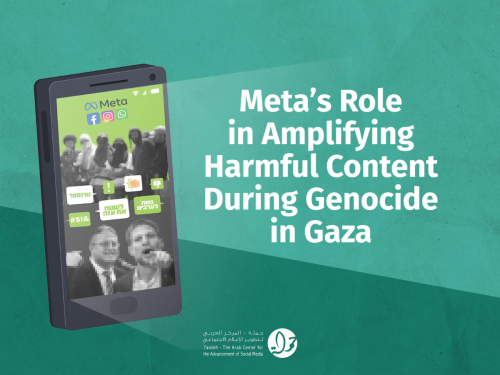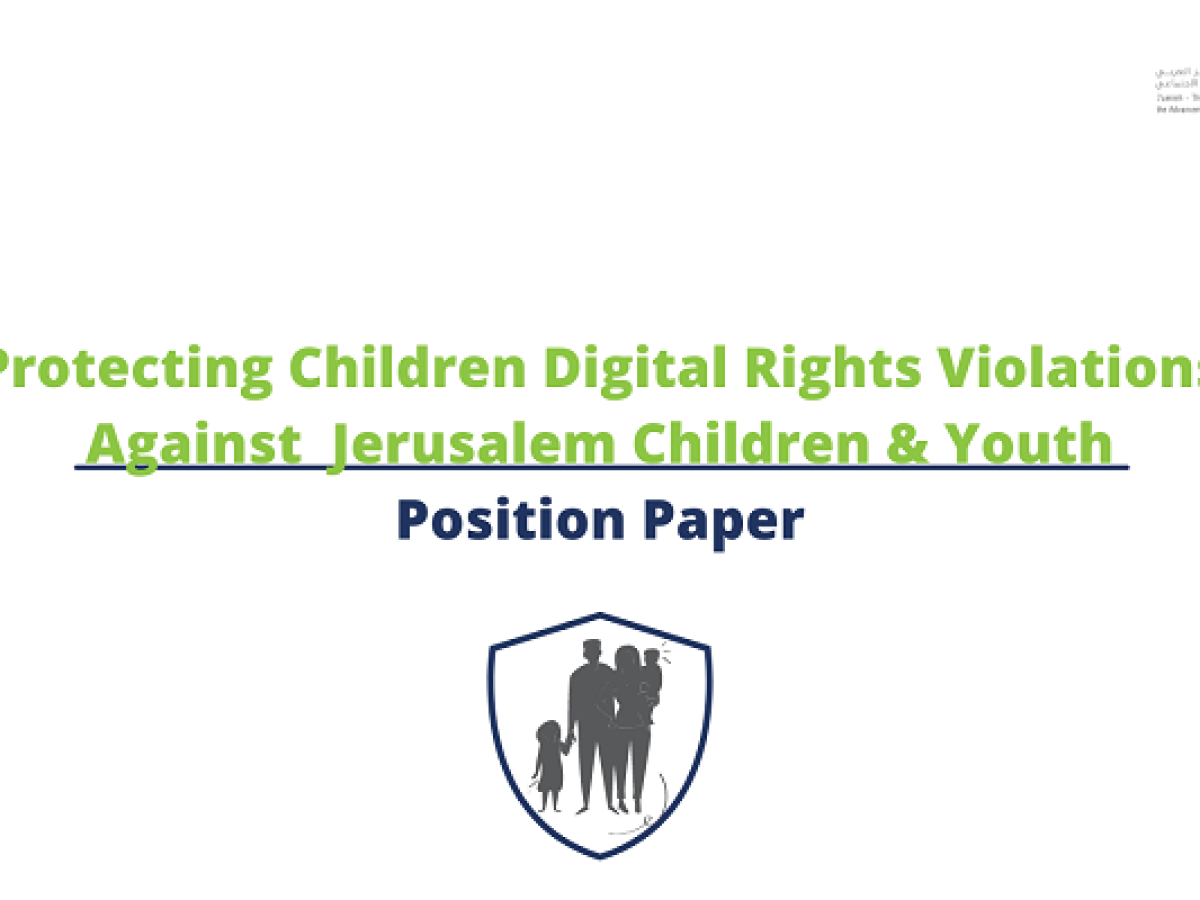
In occupied East Jerusalem, Palestinian residents have long dealt with Israeli policies and practices that violate Palestinian human rights including systematic violations of fundamental human rights, social, economic, and political rights. Youth under the age of 25, make up a large demographic of the population in East Jerusalem, and as of 2019, 81 per cent of Palestinian children in East Jerusalem live below the poverty line and roughly 33 per cent of Palestinian adolescents in East Jerusalem do not complete the full 12 years of schooling, compared to only 1.5 per cent for Israeli-Jewish students. The above data is alarming with short term and long-term humanitarian implications that need to be further analyzed because it also affects the enabling environment of children and youth.[1]
The virtual world has become the primary space where children and youth in occupied East Jerusalem spend their time. 42 per cent use the Internet for more than 5 hours per day, while 31 per cent use it for 3 - 5 hours per day.[2] It has also become the space where they express their opinions and political views. However, 87 per cent of children and youth rarely or never participate in political discussions online due to fear of prosecution from the authorities who monitor their social media content. Additionally, 35 per cent of Palestinian youth active on social media, fear government surveillance of their activities and 20 per cent feel constantly unsafe expressing opinions online.[3] In addition to being under surveillance and targeted by Israeli authorities, many youth are exposed to cyber bullying, pornographic material, extortion, theft of personal virtual accounts, theft of personal information, threats, social or political persecutions resulting from sharing personal opinions, sexual harassment, and other forms of abuse.[4]
Amongst youth, parents and youth workers in East Jerusalem specifically, there is a lack of awareness about how to protect oneself from other dangers such as hacking, privacy breaches and cyber bullying. Primary care givers and school counsellors are lacking the skills to protect children and youth online and 51 per cent of mothers and 82 per cent of counselors admit that they lack the skills to monitor adolescents’ internet use, leaving many Palestinian youth vulnerable to the dangers of the digital space.
Cyber bullying was also found to be extremely common among Palestinian Jerusalemite children and youth; 58 per cent of the participants said that they were subjected to verbal abuse while using the internet. 24 per cent were subjected to bullying and 13 per cent were subjected to blackmail. It should also be noted that 10 per cent were subjected to sexual harassment online.
In 2014, the Israeli government approved Resolution 1775 and put forward a strategy for increasing “security” in occupied East Jerusalem and Palestinian communities within the Green Line[5]. In 2015, the Jerusalem Police district plan included the investment of 48.9 million NIS in the increasing control on East Jerusalem by purchasing and installing CCTV cameras and surveillance technology in East Jerusalem[6], violating the privacy rights of Palestinians including Youth and children and further limits freedom of expression, and their ability to demand their human rights be respected.
Since 2000, a total of 8,000 children have been arrested by the Israeli authorities.[7] Addameer’s documentation reports that Israel prosecutes 500 to 700 children in military courts every year, some as young as 12 years old.[8] In East Jerusalem alone, from January until the end of April, 2021 Israeli authorities arrested 230 Palestinian children, and put 27 children in solitary confinement.[9] The reasons behind arrests and detentions range from stone throwing to posts on social media platforms, targeting young Palestinians and putting them in vulnerable situations.
Despite the dangers, Palestinian youth in East Jerusalem are politically active both online and offline. While there is not an exact number to draw upon, many young people in East Jerusalem document human rights violations they witness in the streets and attend political events including demonstrations.
Most Recent Example
As a part of Israel’s efforts to annex East Jerusalem, Palestinians in the neighborhoods of East Jerusalem, face the constant threat of displacement at the behest of Israeli settler organizations, the courts and authorities.[10] Starting in April 2021, the movement against the possible removal of Palestinian families in the Sheikh Jarrah neighborhood, gained traction on both social media and on the ground.[11] Many Palestinian youth and grassroots groups started protesting the forcible displacement of families in Sheikh Jarrah, and Silwan. The grassroots movement also grew in social media and included Palestinian Citizens of Israel, occupied Palestinian territory and international supporters who took to social media to call for protection of these Palestinian families in East Jerusalem.[12] Peaceful protests were met with unlawful Israeli police violence and multiple arrests of Palestinian youth.[13] In addition, Israel worked to censor activists online and targeted social media networks. 7amleh reported more than 600 reports of takedowns and censorship across social media platforms, which have greatly affected Palestinian youth.
Furthermore, since the escalation, censorship on social media platforms has dramatically increased, with hundreds of posts and accounts being taken down without clear justification of violations of terms of service by social media companies, systematically silencing those protesting and documenting the evictions in the neighborhoods of Sheikh Jarrah and Silwan in East Jerusalem as well as other rights violations. Madar center have recently reported 20 accounts of youth journalists that have been blocked, violating their rights and freedoms, with their online activities being monitored and severely controlled by Israeli occupation and social media platforms.[14]
The Israeli Ministry of Justice’s Cyber Unit has also been reporting tens of thousands of cases to social media platforms without legal proceedings and without the knowledge of the user. In 2019, Israel made 19,606 requests to social media companies regarding content takedowns and in 2020 the numbers only continued to rise.[15] This unauthorized and unchecked power allows Israel to govern online speech and censor those who do not align with the political views of the state, mainly targeting politically active Palestinian youth.
The Israeli police, in late May, launched a large-scale arrest operation named “Law and Order”. The authorities claimed that the campaign’s goal was to “restore deterrence and increase governance in designated places in the State of Israel, along with maintaining the personal security of Israeli citizens.”[16] Since May, Israeli police have arrested more than 1,900 people across both Israel and the occupied Palestinian territories, since mid-April[17] 90 per cent being Palestinians, for protesting and for posting pro-Palestinian social media content.[18]
Palestinian children are under significant strain, mainly due to the constant presence of violence in their environments and the pervasive feeling of danger in their lives. As a result, 93 per cent of Palestinian children reported not feeling safe and exposed to attack.[19] Consequently, many Palestinian youth in high pressure states, revert to self-destructive activities, often joining groups that provide them with the feeling of protection. Furthermore, as an outlet, youth are more likely to get involved in protests that can lead to violence and clashes with the police.[20]
Recommendations for Protection of Children’s Digital Rights in East Jerusalem
Local Level
- Youth should have access to information and educational opportunities about how to protect themselves online so that they can exercise their political, economic and social rights. In particular, develop a Digital Security manual detailing tips on how to enhance digital security and tackle issues such as gender based violence online and bullying.
- Palestinian civil society organizations should work with youth to help them better understand their digital rights and how they can protect themselves online. This can be done through integrating the subject of digital safety into topics that relate to youth, including social relations, self expression, public and private spaces as well as the larger context of the political digital sphere.
- Palestinian civil society organizations should work to build the capacity of parents and people working with youth and children on how to protect children and youth online.
- Civil society organizations should advocate and campaign for changes to the policies and practices of authorities that violate youth’s right to freedom of expression, privacy among other digital and human rights.
- Civil society organizations should coordinate their efforts and develop a comprehensive strategy to proactively promote and protect digital security and digital rights for all Palestinian including children and youth in occupied East Jerusalem.
- Strengthen the ability of civil society to monitor and document digital rights violations. This evidence can be used in evidence-based advocacy to hold authorities and social media companies accountable for violations. Document Palestinian youth’s experiences through comprehensive research to better understand the issues and dangers they face in the digital space.
- Improve the relationship between East Jerusalemite youth, children, parents, teachers, counselors, NGOs, and CBOS through collaboration and dialogue to restore trust, solidify bridges to confront concerns, and achieve digital security and stability. This includes education for parents and counselors in understanding the privacy settings on each social media platform and other relevant preventive measures. Capacity building/awareness programs for institutions and school staff in digital safety with special training that includes privacy and tips on how to protect virtual accounts across different platforms from hacking or theft.
International Level
- Protect the rights of Palestinian children and youth, including digital rights and provide support for their activism and full protection in accordance with international law.
- Should exert pressure on Israel to comply with UN resolutions and respect international laws that protect the Palestinian population living under occupation, especially those of children and youth, and publicly condemn violations of these rights.
- Support and collaborate with Palestinian civil society organisations working to tackle the issues of digital rights violations and bring awareness to violations of children and youth’s rights in Palestine.
In occupied East Jerusalem, Palestinian residents have long dealt with Israeli policies and practices that violate Palestinian human rights including systematic violations of fundamental human rights, social, economic, and political rights. East Jerusalem is the second poorest city in Israel. Youth under the age of 25, make up a large demographic of the population in East Jerusalem, and as of 2019, 81 per cent of Palestinian children in East Jerusalem live below the poverty line and roughly 33 per cent of Palestinian adolescents in East Jerusalem do not complete the full 12 years of schooling, compared to only 1.5 per cent for Israeli-Jewish students. The above data is alarming with short term and long-term humanitarian implications that need to be further analyzed because it also affects the enabling environment of children and youth.
The virtual world has become the primary space where children and youth in occupied East Jerusalem spend their time. 42 per cent use the Internet for more than 5 hours per day, while 31 per cent use it for 3 - 5 hours per day. It has also become the space where they express their opinions and political views. However, 87 per cent of children and youth rarely or never participate in political discussions online due to fear of prosecution from the authorities who monitor their social media content. Additionally, 35 per cent of Palestinian youth active on social media, fear government surveillance of their activities and 20 per cent feel constantly unsafe expressing opinions online. In addition to being under surveillance and targeted by Israeli authorities, many youth are exposed to cyber bullying, pornographic material, extortion, theft of personal virtual accounts, theft of personal information, threats, social or political persecutions resulting from sharing personal opinions, sexual harassment, and other forms of abuse.
Amongst youth, parents and youth workers in East Jerusalem specifically, there is a lack of awareness about how to protect oneself from other dangers such as hacking, privacy breaches and cyber bullying. Primary care givers and school counsellors are lacking the skills to protect children and youth online and 51 per cent of mothers and 82 per cent of counselors admit that they lack the skills to monitor adolescents’ internet use, leaving many Palestinian youth vulnerable to the dangers of the digital space.
Cyber bullying was also found to be extremely common among Palestinian Jerusalemite children and youth; 58 per cent of the participants said that they were subjected to verbal abuse while using the internet. 24 per cent were subjected to bullying and 13 per cent were subjected to blackmail. It should also be noted that 10 per cent were subjected to sexual harassment online.
In 2014, the Israeli government approved Resolution 1775 and put forward a strategy for increasing “security” in occupied East Jerusalem and Palestinian communities within the Green Line. In 2015, the Jerusalem Police district plan included the investment of 48.9 million NIS in the increasing control on East Jerusalem by purchasing and installing CCTV cameras and surveillance technology in East Jerusalem, violating the privacy rights of Palestinians including Youth and children and further limits freedom of expression, and their ability to demand their human rights be respected.
Since 2000, a total of 8,000 children have been arrested by the Israeli authorities. Addameer’s documentation reports that Israel prosecutes 500 to 700 children in military courts every year, some as young as 12 years old. In East Jerusalem alone, from January until the end of April, 2021 Israeli authorities arrested 230 Palestinian children, and put 27 children in solitary confinement. The reasons behind arrests and detentions range from stone throwing to posts on social media platforms, targeting young Palestinians and putting them in vulnerable situations.
Despite the dangers, Palestinian youth in East Jerusalem are politically active both online and offline. While there is not an exact number to draw upon, many young people in East Jerusalem document human rights violations they witness in the streets and attend political events including demonstrations.
Most Recent Example
As a part of Israel’s efforts to annex East Jerusalem, Palestinians in the neighborhoods of East Jerusalem, face the constant threat of displacement at the behest of Israeli settler organizations, the courts and authorities. Starting in April 2021, the movement against the possible removal of Palestinian families in the Sheikh Jarrah neighborhood, gained traction on both social media and on the ground. Many Palestinian youth and grassroots groups started protesting the forcible displacement of families in Sheikh Jarrah, and Silwan. The grassroots movement also grew in social media and included Palestinian Citizens of Israel, occupied Palestinian territory and international supporters who took to social media to call for protection of these Palestinian families in East Jerusalem. Peaceful protests were met with unlawful Israeli police violence and multiple arrests of Palestinian youth. In addition, Israel worked to censor activists online and targeted social media networks. 7amleh reported more than 600 reports of takedowns and censorship across social media platforms, which have greatly affected Palestinian youth.
Furthermore, since the escalation, censorship on social media platforms has dramatically increased, with hundreds of posts and accounts being taken down without clear justification of violations of terms of service by social media companies, systematically silencing those protesting and documenting the evictions in the neighborhoods of Sheikh Jarrah and Silwan in East Jerusalem as well as other rights violations. Madar center have recently reported 20 accounts of youth journalists that have been blocked, violating their rights and freedoms, with their online activities being monitored and severely controlled by Israeli occupation and social media platforms.
The Israeli Ministry of Justice’s Cyber Unit has also been reporting tens of thousands of cases to social media platforms without legal proceedings and without the knowledge of the user. In 2019, Israel made 19,606 requests to social media companies regarding content takedowns and in 2020 the numbers only continued to rise. This unauthorized and unchecked power allows Israel to govern online speech and censor those who do not align with the political views of the state, mainly targeting politically active Palestinian youth.
The Israeli police, in late May, launched a large-scale arrest operation named “Law and Order”. The authorities claimed that the campaign’s goal was to “restore deterrence and increase governance in designated places in the State of Israel, along with maintaining the personal security of Israeli citizens.” Since May, Israeli police have arrested more than 1,900 people across both Israel and the occupied Palestinian territories, since mid-April 90 per cent being Palestinians, for protesting and for posting pro-Palestinian social media content.
Palestinian children are under significant strain, mainly due to the constant presence of violence in their environments and the pervasive feeling of danger in their lives. As a result, 93 per cent of Palestinian children reported not feeling safe and exposed to attack. Consequently, many Palestinian youth in high pressure states, revert to self-destructive activities, often joining groups that provide them with the feeling of protection. Furthermore, as an outlet, youth are more likely to get involved in protests that can lead to violence and clashes with the police.
Recommendations for Protection of Children’s Digital Rights in East Jerusalem
Local Level
-
Youth should have access to information and educational opportunities about how to protect themselves online so that they can exercise their political, economic and social rights. In particular, develop a Digital Security manual detailing tips on how to enhance digital security and tackle issues such as gender based violence online and bullying.
-
Palestinian civil society organizations should work with youth to help them better understand their digital rights and how they can protect themselves online. This can be done through integrating the subject of digital safety into topics that relate to youth, including social relations, self expression, public and private spaces as well as the larger context of the political digital sphere.
-
Palestinian civil society organizations should work to build the capacity of parents and people working with youth and children on how to protect children and youth online.
-
Civil society organizations should advocate and campaign for changes to the policies and practices of authorities that violate youth’s right to freedom of expression, privacy among other digital and human rights.
-
Civil society organizations should coordinate their efforts and develop a comprehensive strategy to proactively promote and protect digital security and digital rights for all Palestinian including children and youth in occupied East Jerusalem.
-
Strengthen the ability of civil society to monitor and document digital rights violations. This evidence can be used in evidence-based advocacy to hold authorities and social media companies accountable for violations. Document Palestinian youth’s experiences through comprehensive research to better understand the issues and dangers they face in the digital space.
-
Improve the relationship between East Jerusalemite youth, children, parents, teachers, counselors, NGOs, and CBOS through collaboration and dialogue to restore trust, solidify bridges to confront concerns, and achieve digital security and stability. This includes education for parents and counselors in understanding the privacy settings on each social media platform and other relevant preventive measures. Capacity building/awareness programs for institutions and school staff in digital safety with special training that includes privacy and tips on how to protect virtual accounts across different platforms from hacking or theft.
International Level
-
Protect the rights of Palestinian children and youth, including digital rights and provide support for their activism and full protection in accordance with international law.
-
Should exert pressure on Israel to comply with UN resolutions and respect international laws that protect the Palestinian population living under occupation, especially those of children and youth, and publicly condemn violations of these rights.
-
Support and collaborate with Palestinian civil society organisations working to tackle the issues of digital rights violations and bring awareness to violations of children and youth’s rights in Palestine.
Related Articles
Subscribe to Our Email Alerts
And stay updated with our latest activities, news, and publications!

